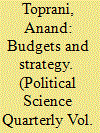|
|
|
Sort Order |
|
|
|
Items / Page
|
|
|
|
|
|
|
| Srl | Item |
| 1 |
ID:
165796


|
|
|
|
|
| Summary/Abstract |
ANAND TOPRANI discusses the origins and significance of the 1949 “Revolt of the Admirals.” He argues that the unification of the U.S. military services and subsequent defense budget cuts made this rivalry among the military services intense. He concludes that inter-service rivalry was mitigated only by increases in defense spending and by civilian leaders allowing the services to determine how to allocate resources.
|
|
|
|
|
|
|
|
|
|
|
|
|
|
|
|
| 2 |
ID:
146809


|
|
|
|
|
| Contents |
The German summer offensive against the Soviet Union in 1942, Case Blue, is one of the most famous campaigns in history thanks to the Battle of Stalingrad. Although historians agree that the offensive’s aim was control of the Caucasian oilfields, there is a widespread misconception that Baku was the main objective. German ambitions were in fact rather modest—the primary objectives were the smaller and more accessible oilfields of Maikop and Grozny. The Germans were also just as determined to deny the Soviets access to Caucasian oil by severing transit along the Volga as they were to secure the oil for themselves.
|
|
|
|
|
|
|
|
|
|
|
|
|
|
|
|
| 3 |
ID:
112146


|
|
|
|
|
| Publication |
2012.
|
| Summary/Abstract |
For almost twenty years, the so-called Red Line Agreement compelled the members of the multi-national Iraq Petroleum Company (IPC) to operate collectively within the Persian Gulf. In 1946, however, the two American members of the IPC announced that they were acquiring a 40% stake in the American-owned Arabian American Oil Company (ARAMCO), which held the most important oil concession in Saudi Arabia. The French member of the IPC (and by extension, the French Government, which was a major shareholder in the company) strongly protested, but eventually accepted a settlement that abrogated the Red Line Agreement and allowed for the expansion of ARAMCO. Although many studies have analyzed these events as an important episode in the history of the international oil industry, this article examines them within the context of U.S.-French relations and the early Cold War. It argues that the major American oil companies and the U.S. Government expended considerable effort in brokering an amicable settlement, and that the French received more favorable terms than previously assumed.
|
|
|
|
|
|
|
|
|
|
|
|
|
|
|
|
| 4 |
ID:
135821


|
|
|
|
|
| Summary/Abstract |
German grand strategy during World War II included making Europe independent of oil imported from sources controlled by the United Kingdom, the United States, and the USSR. The first step was to wrest control of oilfields. Producing and distributing the oil, however, required the creation of a company capable of replacing the evicted British, American, and Soviet suppliers. Therefore, in 1941, the Third Reich established the Continental Oil Company. Analysis of the company’s foundation and operations sheds light on the objectives of the Third Reich, including the postwar economic development of Axis Europe and the extension of German hegemony beyond the USSR into the Middle East.
|
|
|
|
|
|
|
|
|
|
|
|
|
|
|
|
| 5 |
ID:
146366


|
|
|
|
|
| Summary/Abstract |
The National Socialists’ primary foreign policy objective after taking office was to rearm Germany so that it might reverse the verdict of the First World War and acquire the “living space” necessary to becoming a world power on par with Britain or the United States.
|
|
|
|
|
|
|
|
|
|
|
|
|
|
|
|
| 6 |
ID:
170925


|
|
|
|
|
| Summary/Abstract |
The ‘unification’ of the United States Army and Navy under the 1947 National Security Act, combined with efforts to cut expenditures after the Second World War, spawned vicious inter-service competition that undermined civilian control of the military. The nastiest feuds were between the Air Force and Navy, and then the Navy and civilian leaders of the fledgling Department of Defence. What appears as an esoteric dispute over the utility of bombers versus aircraft carriers was merely the tip of a larger struggle over the future of American military strategy. Civilian efforts to end this destructive inter-service rivalry and force the military to live within its budgetary constraints provoked open defiance during the so-called ‘Revolt of the Admirals’ in 1949. National Security Council Paper 68 offered a way out of this predicament by outlining a quasi-Keynesian fiscal policy based on rearmament that would stimulate the economy enough to offset the additional defence spending.
|
|
|
|
|
|
|
|
|
|
|
|
|
|
|
|
| 7 |
ID:
184610


|
|
|
|
|
| Summary/Abstract |
Should a Sino-American War start, how will the US deal with the inevitable military setbacks? Most importantly, what would happen if the US loses not simply a battle, but rather a series of engagements culminating in an unmistakable defeat that results in unfavourable peace terms? The US may not like thinking about losing, but considering China’s growing capabilities, it can no longer assume victory. Anand Toprani, Nicholas Murray and Michael Dennis argue that, if the US thinks about the consequences of war, and cooperating and working together as a country, it can avoid a conflict with China, and recover more quickly and equitably if it does fight and lose.
|
|
|
|
|
|
|
|
|
|
|
|
|
|
|
|
|
|
|
|
|